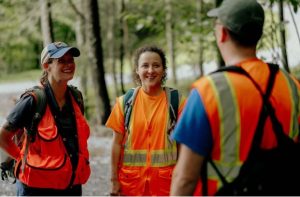Jan 7, 2025
“Bats are truly incredible. You can feel the wind from their wings as they fly past your face without ever touching you.”
Sara McLaughlin-Johnson, a Terrestrial Zoologist in Biological Compliance, is an extension of TVA’s environmental mission. Whether it’s boots-on-the-ground field work or ensuring compliance with environmental policies, Sara never stops marveling at the intricacies of our ecosystem.
“In my job, we do work that is legally necessary, but also, we want to be good stewards of the Valley region,” Sara explained. “The changes that TVA has willingly made in order to be good stewards of the environment, since the inception of TVA and the building of the first dam until now, have been vital to protecting our resources. And I get to help see that through.”
Sara is constantly learning about the needs of species, how our actions affect the resources we share and how to modify those actions to be more friendly to our environment.
It’s this idea of continuous improvement that drives Sara’s work, and as the Valley region continues to see accelerated growth in population, her job requires her to confront the challenges that come with balancing energy and environment.
“We are striving toward a cleaner future,” Sara said. “At TVA we are finding reasonable alternatives to keep the lights on while also being caretakers for the species that have always called this place home.”
Sara is surrounded by regionally renowned scientists—some of the top in their field. Together, these minds are working to collect meaningful data that informs how scientists across disciplines interact with natural resources and make decisions that will shape our future.
“When I look through the datasets and see my name attached to some of that data, I feel proud,” Sara shared. “Contributing to a larger biodiversity data management platform that helps not only us as an agency, but also many other U.S. states and Canadian provincial agencies be good stewards of the environment is one of the best things I could hope for.”
And datasets aren’t the only place Sara has left her mark. She’s even gotten to explore and name a cave in East Tennessee—Turtle Tomb Pit Cave.
Sara’s job is proof that delicate discoveries matter—because, combined, the little things make a big impact. From the mussels that act as biological water filters to the snail darter fish and countless other aquatic and amphibious species whose presence is an indicator of various water quality parameters, there is just so much happening right under our noses.
“In balancing all of these things,” Sara said, “We have the opportunity to change public perceptions about what we do here at TVA.”
Additionally, as an advocate and voice for these creatures, Sara seeks to change people’s perception on animals they might normally find unsettling.
“I want people to know that bats, snakes, amphibians and insects aren’t scary,” Sara said. “Society is so removed from where we come from —the land and the species we inhabit this planet with—getting back in touch with your primal side is vital to knowing that everything is interconnected. Movies and stories have vilified these creatures over the years. People need to know these creatures serve a purpose, and if you learn about them, it might make them less scary. Information is a powerful tool.”
Change happens in small bites, and Sara is doing her part to inspire future conservationists—especially her son.
“One day when he came home from daycare, he saw a bug while we were playing outside and to my dismay, he squished it. ‘Ewww,’ he said. It was a teachable moment. We started picking up bugs, and I’m teaching him about why they’re so important, why we don’t say yuck, why we don’t kill them.
Now, he will see ants and other insects on the sidewalk, wave and say ‘Hi, hi, hi!’ in his sweet little sing-song voice.”
Sometimes all it takes is a shift in perspective—learning something new together—to change the course of what’s to come.


